九年级英语 Unit 8 I’ll help clean up the city parks教案 人教新目标版
初三英语unit8 i’ll help clean up the city parks.知识精讲 人教版(新目标)
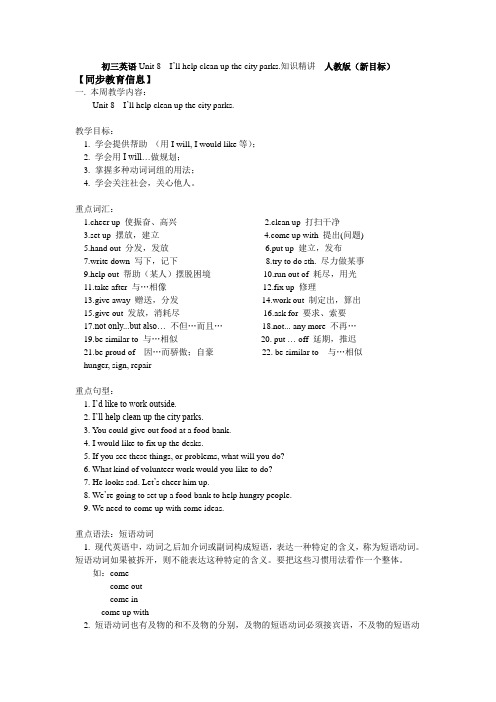
初三英语Unit 8 I’ll help clean up the city parks.知识精讲人教版(新目标)【同步教育信息】一. 本周教学内容:Unit 8 I’ll help clean up the city parks.教学目标:1. 学会提供帮助(用I will, I would like等);2. 学会用I will…做规划;3. 掌握多种动词词组的用法;4. 学会关注社会,关心他人。
重点词汇:1.cheer up 使振奋、高兴2.clean up 打扫干净3.set up 摆放,建立e up with 提出(问题)5.hand out 分发,发放6.put up 建立,发布7.write down 写下,记下8.try to do sth. 尽力做某事9.help out 帮助(某人)摆脱困境10.run out of 耗尽,用光11.take after 与…相像12.fix up 修理13.give away 赠送,分发14.work out 制定出,算出15.give out 发放,消耗尽16.ask for 要求、索要17.not only...but also…不但…而且…18.not... any more 不再…19.be similar to 与…相似20. put … off 延期,推迟21.be proud of 因…而骄傲;自豪22. be similar to 与…相似hunger, sign, repair重点句型:1. I’d like to work outside.2. I’ll help clean up the city parks.3. You could give out food at a food bank.4. I would like to fix up the desks.5. If you see these things, or problems, what will you do?6. What kind of volunteer work would you like to do?7. He looks sad. Let’s cheer him up.8. We’re going to set up a food bank to help hungry people.9. We need to come up with some ideas.重点语法:短语动词1. 现代英语中,动词之后加介词或副词构成短语,表达一种特定的含义,称为短语动词。
九年级英语Unit8 I’ll help clean up the city parks.讲解及练习
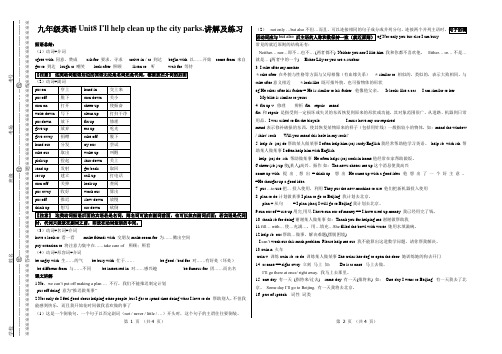
第 1 页 (共4 页) 第 2 页 (共4 页)学校 姓名 班级 考场 考号---------------------------------○密------------------ -------------------○封----------------------------- -- --○线----------------------------※※※※※※※※※※※※※※※答※※※※※※※※※※※※※※※※※※题※※※※※※※※※※※※※※※※线※※※※※※※※※※※※※九年级英语Unit8 I ’ll help clean up the city parks.讲解及练习短语总结: (1)动词+介词agree with 同意,赞成 ask for 要求,寻求 arrive in / at 到达 begin with 以……开始 come from 来自 get to 到达 laugh at 嘲笑 look after 照顾 listen to 听 wait for 等待(2)动词+副词(3)动词+名词+介词have a look at 看一看 make friends with 交朋友make room for 为……腾出空间 pay attention to 将注意力集中在……take care of 照顾;照看 (4)动词+形容词+介词be angry with 生……的气 be busy with 忙于…… be good / bad for 对……有好处(坏处) be different from 与……不同 be interested in 对……感兴趣 be famous for 因……而出名 课文讲解1.No ,we can‟t put off making a plan … 不行,我们不能推迟制定计划 put off doing 意为“推迟做某事”2.Not only do I feel good about helping other people ,but I get to spend time doing what I love to do .帮助别人,不但我能感到快乐,而且我开始花时间做我喜欢做的事了(1)这是一个倒装句。
初中英语九年级课件《Unit 8 I'll help clean up the city park

Grammar
Practice using verb phrases, adjectives, and passive voice to describe activities and actions in the city park.
Speaking
Engage in conversations and role-play activities to improve speaking skills.
交流学习目标
1
展示个人观点
学会表达个人看法和主张,与同学进行有关环保主题的交流。
2
团队合作
通过合作清理城市公园,提高团队合作能力。
3
听力理解
通过听取他人的观点和意见,提高理解能力。
活动设计
种树活动
组织学生合作种树,提高对环境 保护的参与感。
回收站游戏
通过游戏方式教育学生回收利用 废物。
城市公园清理
初中英语九年级课件 《Unit 8 I'll help clean up the city park》
本课将帮助学生提高对保护环境的认识。教学重点是学习如何清理城市公园 以及保护自然资源的重要性。
本课的目标
1 了解城市公园的重要性和保护环境
的必要性。
2 学会描述和交流清理城市公园的经
历和计划。
教学重点
学会使用一些关于环境保护和公园的常用词汇。 掌握动词短语用来描述清理公园的活动。 了解并使用正确的语法结构来描述自己的计划和经历。
教学难点
1 正确使用动词短语和形容词来描述清理城市公园时的活动和环境。 2 掌握使用被动语态来描述清理公园时的行动。
教学内容
Unit 8 Vocabulary
最新-九年级英语上册 Unit 8 I’ll help clean up the
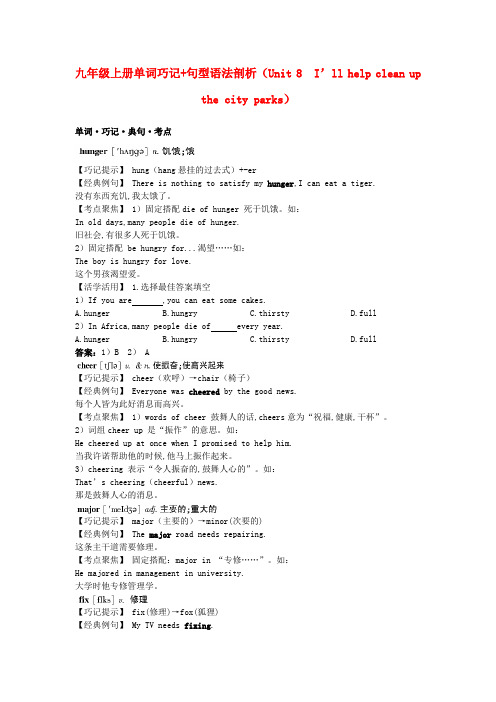
九年级上册单词巧记+句型语法剖析(Unit 8 I’ll help clean upthe city parks)单词·巧记·典句·考点【巧记提示】 hung(hang悬挂的过去式)+-【经典例句】 There is nothing to satisfy my hunger没有东西充饥,我太饿了。
【考点聚焦】 1)固定搭配die of hunger 死于饥饿。
如:In old days,many people die of hunge旧社会,有很多人死于饥饿。
2)固定搭配 be hungry for...渴望……如:这个男孩渴望爱。
【活学活用】 1.选择最佳答案填空1)If you areA.hungerB.hungryC.thirsty2)In Africa,many people die ofA.hungerB.hungryC.thirstyD.full答案:1)B 2)【巧记提示】 cheer(欢呼)→chair(椅子)【经典例句】 Everyone was cheered每个人皆为此好消息而高兴。
【考点聚焦】 1)words of cheer 鼓舞人的话,cheers意为“祝福,健康,干杯”。
2)词组cheer up 是“振作”的意思。
如:He che当我许诺帮助他的时候,他马上振作起来。
3)cheering 表示“令人振奋的,鼓舞人心的”。
如:That’s cheering(cheerful)那是鼓舞人心的消息。
【巧记提示】 major(主要的)→minor(次要的【经典例句】 The major这条主干道需要修理。
【考点聚焦】固定搭配:major in “专修……”。
如:大学时他专修管理学。
【巧记提示】 fix(修理)→fox(狐狸【经典例句】 My TV needs fixing我的电视需要修理了。
【考点聚焦】 1)fix作动词表示“固定”。
如:我把一个木桩固定在地上。
九年级英语第八单元笔记

(3) spend 作“花费 讲时,可以指花费 花费”讲时 花费 讲时, 时间、金钱等), ),其主语通常是人 (时间、金钱等),其主语通常是人 常用于spend ... on sth. 和spend ... ,常用于 (in) doing sth.结构中。例如: 结构中。 结构中 例如: I spent half of my money on clothes. 我花了自己一半的钱来买衣服。 我花了自己一半的钱来买衣服。 He spends a lot of time (in) improving English. 他花大量的时间来提高英语水平。 他花大量的时间来提高英语水平。
Explanation for Section B
1. run out of = use up “用完”、“卖 用完” 用完 光”。句子的主语是人或使用的物。 句子的主语是人或使用的物。 注意不能用于被动语态。 注意不能用于被动语态。 I am running out of my money.= My money is running out of. We are running out of the gas. = Our car is running out of the gas.
引出的疑问句, 【注意】 由need引出的疑问句,答语 注意】 引出的疑问句 表肯定时用must或have to;表示否定 表肯定时用 或 ; 时用needn’t或don’t have to。 时用 或 。 A: Need I come to work tomorrow? 明天我需要来上班吗? 明天我需要来上班吗 B: Yes, you must / have to. 是的, 你必须来。 是的 你必须来。
Not only did they break into his office, but they stole his books. 他们不仅闯入了他的办公室, 他们不仅闯入了他的办公室,而且还偷 了他的书。 了他的书。 Shakespeare was not only a writer, but (also) an actor. 莎士比亚不仅是作家,而且是演员。 莎士比亚不仅是作家,而且是演员。 Not only you but (also) he has been to London. 不但你,而且他也去过伦敦。 不但你,而且他也去过伦敦。
九年级英语全册 Unit 8 I’ll help clean up the city parks(第
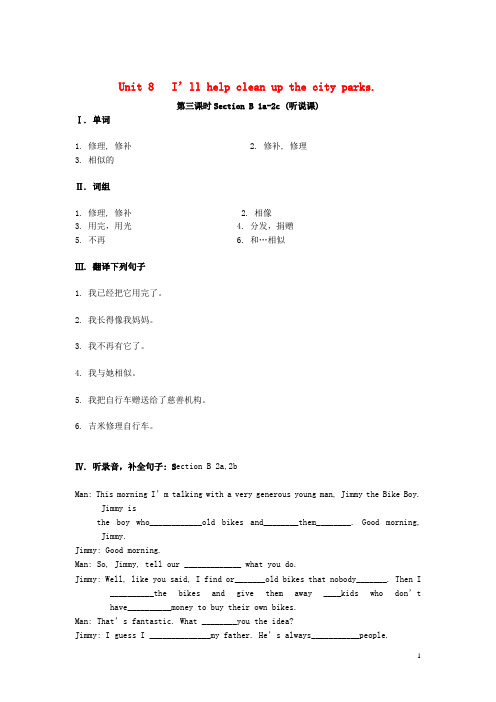
Unit 8 I’ll help clean up the city parks.第三课时Section B 1a-2c (听说课)Ⅰ. 单词1. 修理, 修补2. 修补, 修理3. 相似的Ⅱ. 词组1. 修理, 修补2. 相像3. 用完,用光4. 分发,捐赠5. 不再6. 和…相似Ⅲ. 翻译下列句子1. 我已经把它用完了。
2. 我长得像我妈妈。
3. 我不再有它了。
4. 我与她相似。
5. 我把自行车赠送给了慈善机构。
6. 吉米修理自行车。
Ⅳ. 听录音,补全句子: S ection B 2a,2bMan: This morning I’m talking with a very generous young man, Jimmy the Bike Boy.Jimmy isthe boy who____________old bikes and________them________. Good morning, Jimmy.Jimmy: Good morning.Man: So, Jimmy, tell our _____________ what you do.Jimmy: Well, like you said, I find or_______old bikes that nobody_______. Then I __________the bikes and give them away ____kids who d on’t have__________money to buy their own bikes.Man: That’s fantastic. What ________you the idea?Jimmy: I guess I ______________my father. He’s always___________people.Man: Wow! Your parents must be______________you.Jimmy: I guess s o. But now I’ve ___________________money to buy old bikes. Man: Oh, that’s too bad.Jimmy: Yeah. I need to____________________some way of________money or I’ll have to stop.。
九年级英语-Unit_8_I'll_help_clean_up_the_city_parksAlHHwA
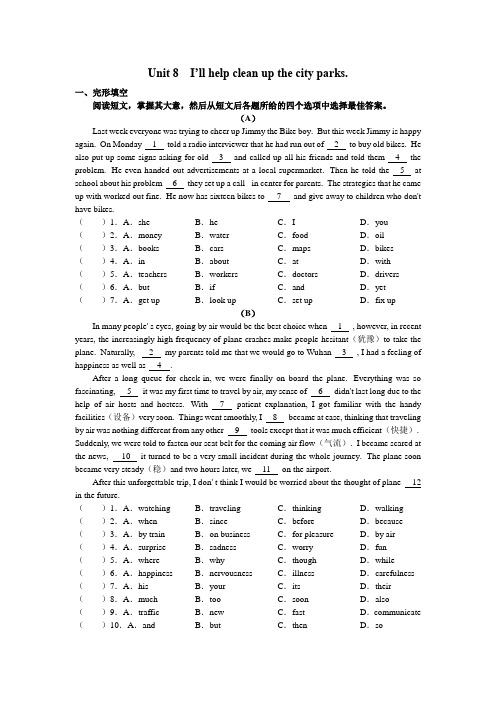
Unit 8 I’ll help clean up the city parks.一、完形填空阅读短文,掌握其大意,然后从短文后各题所给的四个选项中选择最佳答案。
(A)Last week everyone was trying to cheer up Jimmy the Bike boy. But this week Jimmy is happy again. On Monday 1 told a radio interviewer that he had run out of 2 to buy old bikes. He also put up some signs asking for old 3 and called up all his friends and told them 4 the problem. He even handed out advertisements at a local supermarket. Then he told the 5 at school about his problem 6 they set up a call - in center for parents. The strategies that he came up with worked out fine. He now has sixteen bikes to 7 and give away to children who don't have bikes.()1.A.she B.he C.I D.you()2.A.money B.water C.food D.oil()3.A.books B.cars C.maps D.bikes()4.A.in B.about C.at D.with()5.A.teachers B.workers C.doctors D.drivers()6.A.but B.if C.and D.yet()7.A.get up B.look up C.set up D.fix up(B)In many people' s eyes, going by air would be the best choice when 1 , however, in recent years, the increasingly high frequency of plane crashes make people hesitant(犹豫)to take the plane. Naturally, 2 my parents told me that we would go to Wuhan 3 , I had a feeling of happiness as well as 4 .After a long queue for check-in, we were finally on board the plane.Everything was so fascinating, 5 it was my first time to travel by air, my sense of 6 didn't last long due to the help of air hosts and hostess.With 7 patient explanation, I got familiar with the handy facilities(设备)very soon. Things went smoothly, I 8 became at ease, thinking that traveling by air was nothing different from any other 9 tools except that it was much efficient(快捷). Suddenly, we were told to fasten our seat belt for the coming air flow(气流). I became scared at the news, 10 it turned to be a very small incident during the whole journey. The plane soon became very steady(稳)and two hours later, we 11 on the airport.After this unforgettable trip, I don' t think I would be worried about the thought of plane 12 in the future.()1.A.watching B.traveling C.thinking D.walking ()2.A.when B.since C.before D.because ()3.A.by train B.on business C.for pleasure D.by air()4.A.surprise B.sadness C.worry D.fun()5.A.where B.why C.though D.while()6.A.happiness B.nervousness C.illness D.carefulness ()7.A.his B.your C.its D.their()8.A.much B.too C.soon D.also()9.A.traffic B.new C.fast D.communicate ()10.A.and B.but C.then D.so()11.A.took B.landed C.flew D.jumped()12.A.accident B.time C.story D.speed二、阅读理解(A)()1.You can read ________ to find the new movies.A.P. 28 B.P. 12 C.P. 15 D.P. 26()2.From P. 16 you can get something on________.A.news B.sports C.people D.weather ()3.Where can you read the index?A.On TV. B.In a magazine.C.In a theater.D.In a restaurant.(B)Jane' s school day starts at eight - thirty. It begins with a group discussion of the Children' s News - round of the night before. After that, the children usually have a math or an English lesson. At ten -thirty there is a fifteen -minute break. Then the children play outside. After the break they have geography, history, or biology. In most Canadian schools the children are divided into groups that stay together all day. Each group has its own teacher, who teaches almost every subject.At twelve- fifteen the children eat their sandwiches at home or school. After that, they play all kinds of games, like marbles, skipping, ball, and tag.Jane' s school day goes on, and she starts up at one o' clock. In the afternoon, the children study French or math, or they have a music class, physical education, or swimming lessons. Sometimes they put on plays. There are two computers in the classroom. The children take turns using them. Today it is Jane' s turn to use the computer and she will work on math.School finishes at half past three. Jane goes home by bike directly.()1.Children have math after________.A.discussion B.break C.breakfast D.lunch()2.When do children have geography?A.At 8: 30.B.At 12: 15.C.In the afternoon.D.After the break.()3.After lunch, children________.A.have swimming lessons B.play all kinds of gamesC.have physical education D.play computer games()4.Children take turns ________ in the classroom.A.having lunch B.using computersC.putting on a play D.taking a break()5.We can learn from the text that children ________.A.have little chance of playing games B.study only one subjectC.learn, play and have fun at school D.all go home by bus(C)One night Matt saw his grandmother was holding a flashlight. “Are you searching for something, Grandma?” he asked. “I'm going to search for sea turtle nests(巢穴). Come with me,” replied his grandma.Matt's teacher had said there were few sea turtles left in the world, so people were helping to save them. Matt could hardly wait to search for sea turtle nests.On the way to the beach, Matt carried some wooden sticks(小棍)and a roll of wide yellow tape. While walking, Grandma described how mother sea turtles scoop a hole in the sand. Then they lay their eggs and finally cover them up with sand. In this way the sea turtle mothers make sure their eggs stay warm and safe until they hatch(孵化).“Why do you want to find the nests?” Matt asked.“We mark the nests with yellow tape to make people notice where the nests are. Without the tape to signal where the nests are, people might walk or drive on them and pack down the sand. This could hurt the eggs or cause the baby sea turtles not to be able to dig their way out after they hatch.”“After they hatch, the baby go out to the sea, following the light that shines off the ocean,”Grandma said.“People who live along the beach turn off outside lights at night during the hatching season. They want to help make sure the baby turtles go toward the light shining on the ocean.”At the beach Matt and his grandmother began searching for signs of sea turtles. Soon Matt found a wavy path near the water. Together Matt and Grandma marked the nest. They hammered tall sticks into the sand and tied the yellow tape around them.Two months later, Matt was anxious to check on the nest that he had helped mark. So that night he and his grandmother walked down to the beach under a beautiful full moon. The moonlight formed a silvery pathway from the shore out to sea. As Matt and his grandmother got to the nest, the sand began to move. From under the sand baby sea turtles came out, fighting their way to the surface(表面). As they struggled toward the water, a gentle wave picked them up and took them out to their new home.1.When Grandma asked him to search for sea turtle nests, Matt was________.A.bothered because he had to waitB.proud of his grandmother' s behaviorC.excited for he could help the creaturesD.nervous for he was not sure what to do2.Sea turtle nests were marked with the yellow tape so that________.A.visitors could easily find the turtle eggsB.the eggs would not be hurt by accidentC.the mother sea turtle could find her kidsD.Matt and his grandmother could find them3.In which order did things happen?a.The wave picked up the sea turtles to the sea.b.Sea turtles scooped a hole in the sand.c.People living along the beach turned off the lights.d.Sea turtles covered their eggs to keep them safe.e.People marked the nest with the yellow tape.A.b, a, d, e, c B.d, b, c, a, eC.b, d, e, c, a D.d, a, c, e, d4.The main idea of the text is that Matt and his grandmother________.A.helped the sea turtles hatch the eggs in the sand at nightB.saved the sea turtles and helped them find their way homeC.spent some meaningful time with the sea turtles on the beachD.took care of the sea turtle eggs and watched the babies go home三、写作训练(A)9班的同学很愿意当志愿者,他们根据自己的特长帮助别人做一些力所能及的事。
人教版九年级英语Unit_8_I'll_help_clean_up_the_city_park.Section_A_3

give out
offer help put up
put off
I. 用本部分所学词组填空。
set up 1.They plan to_______ another bridge on the river.
2.She helped to give out ________ food during the earthquake.
How do these people help others?
By volunteering
Different volunteer work we can do
Clean up the city park
Help the animals
Plant trees
Work in a food bank
Not only did they break into his office, but they stole his books. 他们不仅闯入了他的办公室,而且还偷 了他的书。 Shakespeare was not only a writer, but (also) an actor. 莎士比亚不仅是作家,而且是演员。 Not only you but (also) he has been to London. 不但你,而且他也去过伦敦。
Reading (3a: P62)
The kinds of work the volunteers do: 1. Work in the after-school care center,
2. Helping young children to read;
3. Work in an animal hospital;
True or false
- 1、下载文档前请自行甄别文档内容的完整性,平台不提供额外的编辑、内容补充、找答案等附加服务。
- 2、"仅部分预览"的文档,不可在线预览部分如存在完整性等问题,可反馈申请退款(可完整预览的文档不适用该条件!)。
- 3、如文档侵犯您的权益,请联系客服反馈,我们会尽快为您处理(人工客服工作时间:9:00-18:30)。
Unit 8 I’ll help to clean up the city parks.本周教学内容:一.[话题](Topic) Offer help二.[重点词组](Key Phrases)1.cheer up 使振奋、高兴2.clean up 打扫干净3.set up 摆放,建立e up with 提出(问题)5.hand out 分发,发放6.put up 建立,发布7.write down 写下,记下8.try to do sth 尽力做某事9.help out 帮助(某人)摆脱困境10.run out of 耗尽,用光11.take after 与…相像 12.fix up 修理13.give away 赠送,分发14.work out 制定出,算出15.give out 发放,消耗尽 16.ask for 要求、索要17.not only...but also 不但…而且… 18.not... any more 不再19.be similar to 与…相似20.Clean-up Day 清节日三.[交际用语]1. I’d like to work outside.2. I’ll help clean up the city parks.3. You could volunteer in an after-school study program.4. I would like to fix up the desks.5. If you see these things, or problems, what will you do?6. What kind of volunteer work would you like to do?四 [重点难点释义](Language Points)1.I’d like to work outside. 我想到外面去工作。
would like 是个固定词组,意为“想要”、“愿意”。
其具体用法如下:(1)would like后接动词不定式作宾语。
He would like to play football with us this Sunday. 这周日他想要和我们一起打篮球。
(2)would like 后接名词作宾语。
I’d like a glass of milk, Mum. 妈妈,我想要一杯牛奶。
(3)would like 后可接名词或代词作宾语,再接形容词、不定式或过去分词作宾补。
I would like you to come over to my family. 我想让你来我家。
They would like the girl happy. 他们想要这个女孩幸福。
I would like your homework finished by 9:00, please. 我希望你的作业在九点钟前完成。
Would you like …? 是would like的一般疑问句结构,是询问“需要”的常见句型之一。
在此句型中表示“一些”时,多用some 代替any,对该句的肯定答语用Yes, please.,否定答语用No, thanks.。
如果like后接动词不定式,则肯定答语常用Yes, I’d like/ love to.。
A: Would you like some apples? 你想吃苹果吗?B: Yes, please. 是的。
A: Would you like something to drink? 你想要些喝的吗?B: No, thanks. 不了,谢谢!A: Would you like to go to the park with us? 你愿意和我们一起去公园吗?B: Yes, I’d love to. 是的,我很愿意去。
2.You could help clean up the city park. 你可以帮助清理城市公园。
(1)could 是情态动词can 的过去式形式,表示过去的能力。
它没有人称和数的变化,后面接原形动词。
变否定句在could后加not, 变一般疑问句把could提前。
The boy could ride a bike when he was seven. 这个男孩七岁时就会骑自行车。
Could you speak Japanese the year before last year? 前年你会讲日语吗?在某些情况下,could 并不表示过去,只是表示委婉、客气的语气。
其肯定答语用:Sure./Certainly./All right.等。
否定答语用:Sorry./Sorry, I can’t.等。
A: Could you tell me if he is a student? 你能告诉我他是不是学生吗?B: Sure. 当然可以。
(2)clean up是省去to的动词不定式,意为“(把……)打扫干净”、“梳理整齐”。
We must clean up the playground every morning. 他每天必须把操场打扫得干干净净。
如果在clean 和up间加个连字符号,那么,它就是名词了,表示“扫除”。
You must give your classroom a good clean-up. 你必须对教室进行彻底地打扫。
3. We need to come up with a plan. 我们必须想出一个计划。
need 是一个常见的动词,表示“需要”之意。
它既可以作实义动词,也可以作情态动词。
其具体用法如下:(1)need用作实义动词,有“必要”、“必需”之意,有人称、数和时态的变化,可以接名词、代词、动名词或带to 的动词不定式作宾语,构成疑问句和否定句时要借助于助动词。
The man needs an English dictionary when he works. 这个人在工作时需要一本英语词典。
Do you need to see him yourself? 你必需亲自见他吗?(2)need用作情态动词,意为“必须”、“必要”,没有人称、数等变化,后接不带to 的动词不定式。
通常用于疑问句和否定句中,构成疑问句和否定句时,不需要使用助动词。
Need you go to the park with your classmate? 你必需和你的同学去公园吗?He needn’t spend much money for this new watch. 他不必花掉这么多钱买这块新手表。
由need引出的疑问句,答语表肯定时用must或have to;表示否定时用needn't 或don't have to。
A: Need I come to work tomorrow? 明天我需要来上班吗?B: Yes, you must / have to. 是的,你必须来。
A: Need I finish the work at once? 我需要马上完成这项工作吗?B: No, you needn't / don’t have to .不,不必今天完成。
4.I take after my other. 我张得像我的妈妈。
take after意为“(在外貌、性格等方面)与(父母)相像”,后面多接指人的词为宾语,一般不用于被动语态。
The twins take after their mother. 这对双胞胎和她们的父母很像。
与take after意思相近的词组还有look like (看去像……)、be like (像……一样)等。
Who does the boy look like? 这个男孩看上去像谁?His brother is like his father, isn’t he? 他的哥哥像他爸爸,对吗?5.Last week everyone was trying to cheer up Jimmy the Bike Boy. 上周所有人都尽量让单车男孩吉米高兴起来。
词组try to do sth. 意思是“尽力去做谋事”,但不强调所做的事是否成功。
Try to finish your work on time, please! 请尽量准时完成你的工作!类似表示“尽力做某事”的词组还有下列两种:try doing sth. 表示“试着去做某事”。
Yesterday the old man tried opening the door. 昨天这位老人试着把门打开了。
manage to do sth. 表示“设法完成某种困难的事”,着重指经过一番努力才能达到的目的。
The woman managed to find her lost son last week. 这位妇女终于找到了上周走失的儿子。
6....and called up all his friends and told them about the problem. ......给他所有的朋友打电话告诉他们他的问题。
①call up 表示“给……打电话”,后面接指人的单词。
Did the boy call up you just for a chat. 这个男孩给你打电话只是为了聊天吗?。
此外,表示“给……打电话”的常见说法还有下列几种:②give …a callThey were giving their teacher a call when I got there. 我到那儿时,他们正在给他们的老师打电话。
③ring upDid you ring up your father last week? 上周你给你的父亲打电话了吗?④give …a ringDo you know who gave Zhang Hua a ring an hour ago? 你知道一小时前谁给张华打电话了吗?⑤telephone / phone…upTelephone up me as soon as you arrive in Shanghai . 你一到上海就给我打电话。
⑥telephone /phone (to)…Will you please telephone to the policeman? 请你给警察打个电话好吗?call up、ring up和telephone / phone…up等是由“动词+副词”构成的词组,如果它们的宾语是代词,这个词要用在副词之前。
Please call him up at once, please! 请马上给他打电话。
Wang Ping isn’t here. I want to phone her up now.王萍没来,我现在正要给他打电话。
